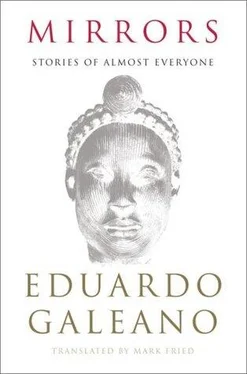If a lady swept her hair off her forehead with the fan closed, it meant: “Do not forget me.”
If she hid her eyes behind the open fan: “I love you.”
If she opened the fan beside her lips: “Kiss me.”
If she rested her lips on the closed fan: “I don’t trust him.”
If she drew her finger across the ribs: “We have to talk.”
If she fanned herself while looking out from the balcony: “Let’s meet outside.”
If she closed her fan upon entering: “Today I cannot go out.”
If she fanned with her left hand: “Do not believe that woman.”

May 25, 1810: it is raining in Buenos Aires. Under umbrellas, a crowd of top hats. White and sky-blue badges are handed around. In what today is called the Plaza de Mayo, the assembled gentlemen in frock coats bellow, “Long live the fatherland” and “Send the viceroy packing.”
In real reality, not airbrushed for a grade-school lithograph, there were no top hats or frock coats, and it seems it was not even raining, so no umbrellas. There was a choir recruited to stand outside and cheer the few men inside City Hall who were discussing independence.
Those few, shopkeepers, smugglers, learned doctors, and military officers, were the founding fathers who would soon lend their names to avenues and streets.
No sooner was independence declared than they established free trade.
Thus the port of Buenos Aires murdered the nation’s embryonic industry just as it was being born in the thread factories, textile mills, distilleries, saddleries, and other artisan workshops of Córdoba, Catamarca, Tucumán, Santiago del Estero, Corrientes, Salta, Mendoza, San Juan. .
A few years later, the British foreign secretary, George Canning, offered a toast to the freedom of Spain’s American colonies:
“Hispanic America is British,” he declared, raising his glass.
Even the curbstones were British.
THE INDEPENDENCE THAT WAS NOT

Thus the lives of the heroes of Latin America’s emancipation came to an end.
Shot by firing squad: Miguel Hidalgo, José María Morelos, José Miguel Carrera, and Francisco de Morazán.
Assassinated: Antonio José de Sucre.
Hanged and quartered: Tiradentes.
Exiled: José Artigas, José de San Martín, Andrés de Santa Cruz, and Ramón Betances.
Imprisoned: Toussaint L’Ouverture and Juan José Castelli.
José Martí fell in battle.
Simón Bolívar died in solitude.
On August 10, 1809, while the city of Quito celebrated its liberation, an anonymous hand wrote on a wall:
Final day of despotism
and first day of the same.
Two years later in Bogotá, Antonio Nariño admitted:
“We have changed masters.”

He preached in the desert and died alone.
Simón Rodríguez, who had been Bolívar’s teacher, spent half a century roving Latin America on the back of a mule, founding schools, and saying what no one wanted to hear.
A fire took nearly all his papers. Here are a few of the words that survived:
• On independence:
We are independent but not free. Something must be done for these poor people, who have become less free than before. Before, they had a shepherd king who did not eat them until they were dead. Now the first to show up eats them alive.
• On colonialism of the mind:
Europe’s know-how and the prosperity of the United States are for our America two enemies of freedom of thought. The new republics are unwilling to adopt anything that does not have their stamp of approval. . If you are going to imitate everything, imitate originality!
• On colonialist trade:
Some think prosperity is seeing their ports filled with ships — foreign ships, and their homes turned into storerooms for goods — foreign goods. Every day brings another load of manufactured clothes, down to the caps the Indians wear. Soon we shall see little golden packages bearing the royal coat of arms containing ‘newly processed’ clay for children accustomed to eating dirt.
• On popular education:
To make students recite by rote what they do not understand is like training parrots. Teach children to be curious so they learn to obey their own minds rather than obeying authorities the way the narrow-minded do, or obeying custom the way the stupid do. He who knows nothing, anyone can fool. He who has nothing, anyone can buy.

The architecture of death is a specialty of the military.
In 1977 the Uruguayan dictatorship erected a gravestone in memory of José Artigas.
This enormous structure was a high-class prison: word had it that the hero might escape, a century and a half after his death.
To decorate the mausoleum and dissemble the intention, the dictatorship wanted to cover it with sayings from the founding father. But the man who had led the first agrarian reform in the Americas, the general who liked to be called “Citizen Artigas,” said that the most downtrodden should become the most privileged. He insisted that our rich patrimony should never be sold off at the low price imposed by need. And he repeated again and again that his authority emanated from the people and did not extend beyond them.
The military found not a single quotation that would not prove dangerous.
They decided Artigas had been mute.
The walls of black marble feature nothing but dates and names.

Domingo Faustino Sarmiento despised José Artigas. No one else did he hate so much. “Traitor to his race,” he called him, and it was true. Artigas, though white and blue-eyed, fought alongside mestizo gauchos and blacks and Indians. And he was defeated and went into exile, and he died in solitude and oblivion.
Sarmiento was also a traitor to his race. Just look at his portraits. At war with what he saw in the mirror, he preached and practiced the extermination of dark-skinned Argentineans and their replacement by blue-eyed Europeans. And he was president of his country, a torch-bearer of civilization, covered in glory and accolades, immortal hero.

The main avenue in Montevideo is called “18 de julio” to honor the day the constitution of Uruguay was born. And the stadium where the very first soccer World Cup was played was built to commemorate the centenary of that foundational document.
The Magna Carta of 1830, identical to the constitution planned for Argentina, denied citizenship to women, the illiterate, slaves, and anyone who was “a paid servant, a day laborer, or a rank and file soldier.” Only one out of ten Uruguayans had the right to be a citizen of the new country, and 95 percent of the population did not vote in the first elections.
So it was throughout the Americas, from north to south. All our countries were born of a lie. Independence disowned those who had risked their lives fighting for her, and women, poor people, Indians, and blacks were not invited to the party. The constitutions draped that travesty in the prestige of legality.
Bolivia took a hundred and eighty-one years to discover that it was a country made up mostly of Indians. The revelation occurred in 2006 when Evo Morales, an Aymara Indian, was elected president by an avalanche of votes.
Читать дальше


















